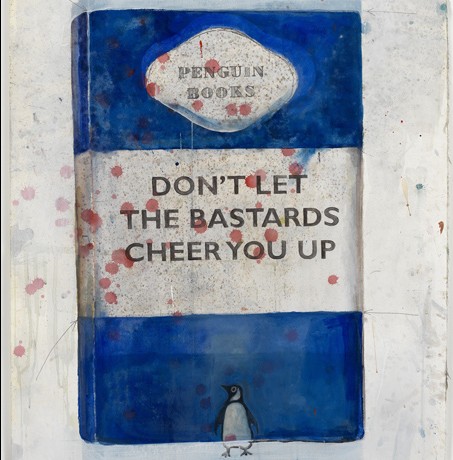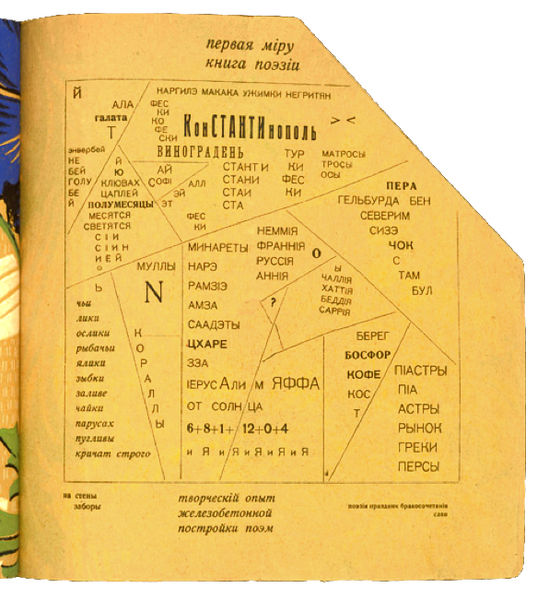Long-time and frequent readers of HU will recognize the ongoing friendly disagreement I have with Matthias Wivel about the degree to which literary things — literary theory and its literary lessons, literary experimentation and its literary insights — are important for comics. I almost said for “literary” comics, but that of course would have begged Matthias’ question, which is in part why comics need to be literary at all.
Toward the end of the lengthy theoretical discussion that erupted in the comments section to his remarkably rich interview with Eddie Campbell (much of which we unjustly ignored in the comments!), Matthias wrote:
I don’t dislike Krauss; in fact I think some of her work is pretty great, but yes, I have at times found her unneccessarily laborious, caught up in linguistic issues that may have been relevant at the time, but now just get in the way of her otherwise good observations.
Is there a way of applying her method to less obviously linguistic insights in visual art? Probably, but my point all along has been: why is that so important?
Caro, you have a real preference for whatever theoretical insights any given work of art may give you, and I am not at all opposed to that — I find that stuff as fascinating as the next man, BUT there are so many other equally valid and compelling ways of experiencing and talking about art, ways that you can frame in exact theoretical terms, but which to my mind don’t necessarily benefit from it.
Art isn’t theory.
In the question about the importance of literary methods and insights to comics (I’ll limit myself here to the discussion of comics, rather than art in general, which Krauss herself has addressed quite often!), there’s more at stake than theoretical answers to ontological/epistemological questions, as interesting as they are. There are practical issues of the artistic scope that comics can and has engaged with as well — and scope not only has implications for understanding — and imagining — the potential of the art form but also for appealing to broad audiences with diverse artistic tastes. I wrote a lengthy response to Matthias about the importance of engagement between comics and literature/literary theory, and Noah asked me to move it from a comment to a post. So here it is (with only minor edits from the comment version).
Matthias, I remember that you’ve made this same basic argument before with regards to literature itself — in the same way that art isn’t theory, comics aren’t literature, and so on and so forth. It’s a sort of medium-specificity that insists on boundaries — and while I GET it, I think those boundaries may be more limiting than they are valuable, for any purposes other than pedagogical.
For my own purposes, as you say, there’s certainly an aesthetic preference at work here — but there’s also an aesthetic agenda for those boundaries to become more permeable. Not permeable so that there’s no possibility of ever deploying the distinction to good effect, but permeable so that there’s more possibility of deploying the mixture to good effect.
It’s partly, as I think we’ve discussed, the fact that theory isn’t a “way of experiencing and talking about art” it’s a way of experiencing and talking about the world — one to which visual art has yet to make its fully evolved contribution. I believe that’s a contribution that needs to be made, considering the impact and reach of theoretical vantage points not only for “talking about art” but also for talking about all kinds of other things, including politics, and identity, and the politics of identity. If the vantage point of art is insufficiently represented there, that is an exclusion — even if it is one that’s largely self-inflicted. Participating in that conversation should in no way prevent all the other ways from experiencing and thinking about art from continuing on apace, as not everybody will be inspired by theory in the same way that not everybody is inspired by aesthetics. Surely there’s room for all of the above?
But it’s also that such an engagement with language/linguistics/literature in particular is more important for comics and important in a different way than it is for visual art. It becomes, to me, a question of broadening the field of comics sub-genres — in English-language comics, at least, currently there are a) a couple of unique genres, the fully visual-narrative and visual-metaphorical ones; b) the comics versions of genre fiction, SF, romance and heroic stories; c) plenty of autobiography and memoir; d) biography; e) journalism; f) children’s stories. Then, there are those few cases that qualify as literary short stories (although those trend toward the visual-narrative and visual-metaphorical genres, for various reasons many of which, I think, are subcultural). There are also a handful of experimental comics (which, as you know, I’m extremely fond of, but that is a very new and nascent genre.)
But there’s very little in comics that’s comparable to — let’s call it “Booker fiction,” the kind of fiction that gets nominated for and wins the Booker prize. (Although Booker books are not really homogeneous and my bias against current American letters is showing; “Pulitzer fiction” just suggests a somewhat different scope and approach to me.) Booker fiction is very engaged with theory — not just contemporary theory but traditional poetics. It also tends to care deeply about literary aesthetics and a range of pleasures that come from prose.
You’ll probably come back with the argument — as you have before — that Booker fiction is a literary genre and that comics doesn’t need to model itself on something so outside. But the question “why shouldn’t it take that genre as a model?” is equally valid. There’s no consistent argument that Booker fiction shouldn’t serve as a model for comics — unless comics is also going to reject all the other literary genres right along with it: popular genre fiction, the literary short story, biography, memoir…
I find the possibility of comics engagement with fiction at the Booker level especially compelling considering that Booker fiction’s engagement with theory and form — both questions and the mechanisms for getting at those questions — is at a point where it needs fertile new terrain, and “the illustrated book” is extraordinarily fertile. Books like Fate of the Artist point in that direction for me, and I think it’s tremendously inspiring. It’s a different direction from the one folks like Warren Craghead and Jason Overby are exploring, and — as marginal as experimental comics is — truly ambitious, truly literary comics are vastly more rare.
At this point, though, I generally have the sense that there are several pressures working against comics producing a work that’s really truly comparable in scope and ambition to a Booker novel. The biggest obstacle is auteurism and the DIY insistence on self-expression, which lead people who don’t have a lot of literary background to resist collaborations drawing on varied expertise (the kind of fecund collaboration, for example, that Anke F. has with Katrin de Vries). Hipster ennui — that classic mix of self-importance with complete and utter lack of seriousness — saturates art comics culture and generates a contempt for complexity and intensity that works against any meaningful engagement with literature. (The hipster problem also severely damages American prose letters and is to some extent at fault in the problem Elif Batuman identified in the LRoB essay we talked about here.) Hipster-fic generally ends up being either irony or what Mike called “me-comics”.
But I also don’t think we should discount the role of disciplinary distinctions here. Art education plays into this as I’ve mentioned before: because English is more valued at the middle and high school level than art, literary people often have much less drawing training than art people have in writing. But this can also lead to a lack of understanding among art people about the differences in the way a trained literary reader will approach, say “The Fortress of Solitude” from the way that same reader will approach “Midnight’s Children”, or the fiction of, say, Umberto Eco. It’s a failure of American education that we don’t equip our students to read those books the way they’re meant to be read before the time when students have to specialize, so that those reading protocols are such specialized protocols. But it nonetheless remains true that those books do demand reading protocols that only highly trained readers have — most people writing comics and writing about comics, even the best writers in comics, aren’t highly trained readers. There are precious few people in art comics who are palpably sophisticated readers by the standards of fiction readers — because a lot of those protocols just aren’t mastered, if they’re even taught, until graduate-level study in literature.
Similarly, the academic art world sometimes seems hermetically sealed: unlike literature departments which (at the graduate level) embraced their “cultural studies” sister departments to the point that traditional literature almost vanished entirely, the “department of art” is very separate — methodologically and institutionally — from departments of visual culture (which tend to be, really, part of that greater diaspora of literature).
But this separation of the disciplines becomes a problem for comics which draws on the media and discourses specific to both. One response has been to claim comics exceptionalism — the only discipline you need to know anything about is comics themselves. But that’s obviously bullshit: comics scholars tend to know art or they tend to know literature, and each enriches their insights in different ways. This is why I brought up Noah’s oft-expressed annoyance at the banal content of many comics: it’s just exasperating to hear people make “literary” claims for a book like Asterios Polyp. It’s a perfectly good pedagogical tool and an interesting experiment in visual device, but by even the middlin’ standards applied to literature, it’s pretty run-of-the-mill as fiction. It’s equally exasperating to read comics criticism that examines a really pedestrian, obvious narrative, something that’s probably intended for diversion and fun, in lofty formalist, new critical terms — the type of review that explicates literary devices which are completely on the surface of the work. It’s like someone writing a piece of student criticism about a student essay. This doesn’t happen nearly as often in professional and semi-professional reviews of prose books. The expectation is that people who read Bookforum understand literature and there’s no need to spell out, or often even point out, the formal devices at work in a book. (And of course, here I’m talking about the semi-professional comics critics, not random people writing about books they love or hate on their personal blogs.)
A great deal of the writing in (and about) comics is — at its absolute best — BFA-level writing. And I’m not talking about prose-craft — I’m talking about the sophistication of the engagement with ideas.
So when claims are made about comics-as-literature, the impression is often that comics people don’t know very much about literature, let alone theory. But the bias against theory seems to be part and parcel of this dual belief that literature and literary structure basically work the same way that art does but just in a different medium, and that what you learned in college is all there is to know about literature. That’s a misperception due almost entirely to these overly-strict boundaries. I do think it’s extremely important for comics that those walls come down.



